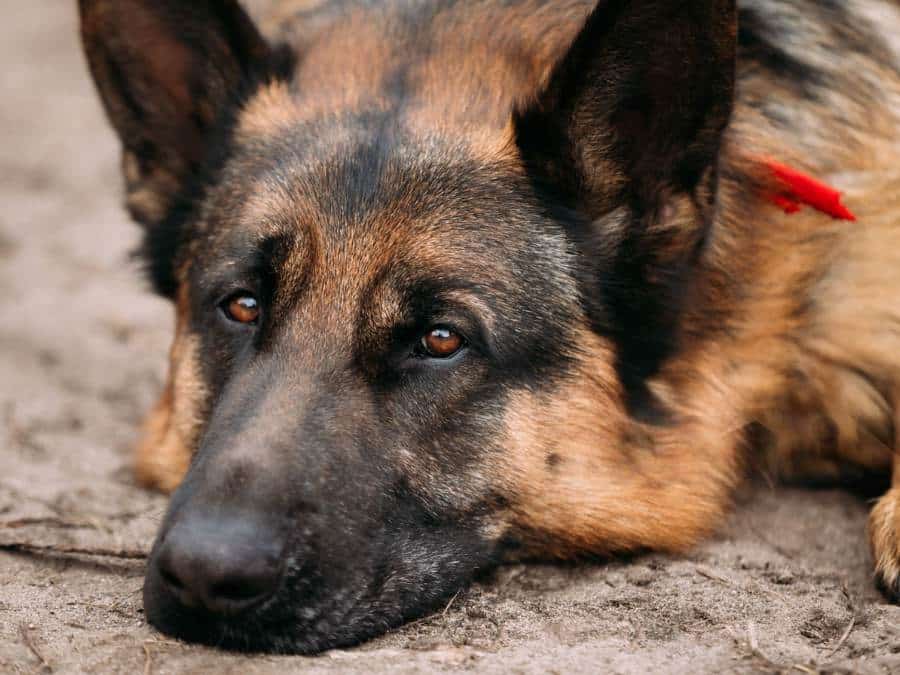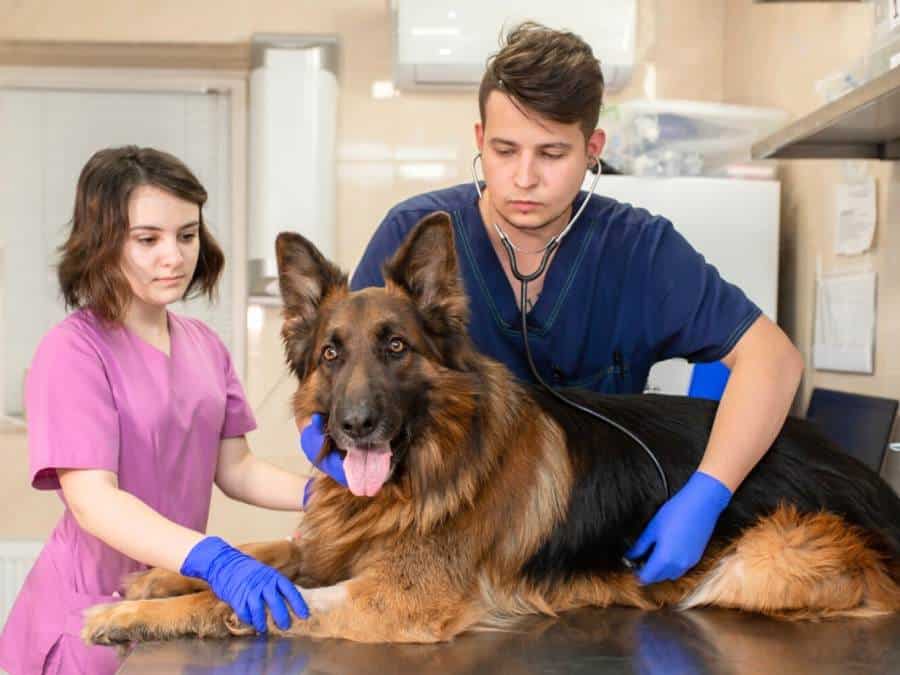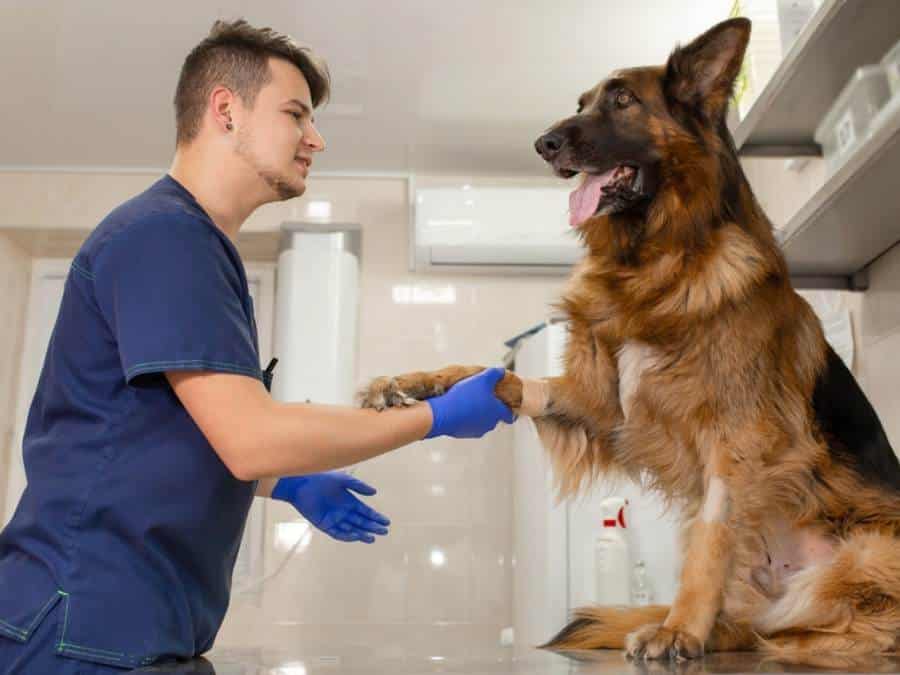Diarrhea is a common problem among German Shepherds. In fact, studies show that up to 70% of dogs experience episodes of diarrhea at some point in their lives.
But what exactly causes this unpleasant digestive issue? And how can you help your furry friend find relief and recover quickly?
In this guide, we will explore the various factors that can lead to diarrhea in German Shepherds, from dietary changes and food intolerances to underlying health conditions and infections.
We’ll also delve into the telltale symptoms to watch out for, such as frequent loose stools, increased urgency for bathroom breaks, and changes in appetite or energy levels.
I’ll provide you with valuable tips on treating and managing your German Shepherd’s diarrhea and creating a routine that promotes healthy digestion.
So let’s get started!
What is diarrhea in dogs?
Diarrhea in dogs is a condition characterized by the frequent and loose passage of feces. It is a common digestive problem and can vary in severity, ranging from mild and temporary to severe and chronic.
Diarrhea occurs when the normal absorption of water and nutrients in the digestive tract is disrupted, leading to an increase in the water content of the stool.
This can result in more frequent bowel movements, urgency to defecate, and the passing of watery or unformed feces.
It can be either acute, meaning it lasts for a short period of time, or chronic, which means it persists for an extended period.
Acute vs. Chronic Diarrhea
Acute diarrhea in dogs typically occurs suddenly and lasts for a few days. It is often caused by dietary indiscretion, which means the dog has eaten something that doesn’t agree with their stomach.
Chronic diarrhea, on the other hand, is characterized by long-lasting loose stools that persist for weeks or even months. This type of diarrhea can be indicative of underlying health issues such as gastrointestinal diseases or infections caused by bacteria or viruses like parvovirus.

Common causes of diarrhea in German Shepherds
Diarrhea in German Shepherds can have various causes, and determining the underlying reason is important for effective treatment. Here are some common causes of German Shepherd diarrhea:
- Dietary Indiscretion: Eating something unusual, spoiled, or incompatible with a dog’s digestive system can lead to diarrhea. This might include scavenging garbage, eating table scraps, or consuming unfamiliar items during walks.
- Sudden Diet Changes: Abrupt changes in a dog’s diet, such as switching to a new brand of food without a gradual transition, can upset the digestive system.
- Bacterial or Viral Infections: Infections caused by bacteria (e.g., Salmonella, E. coli) or viruses (e.g., parvovirus, coronavirus) can lead to gastrointestinal upset and diarrhea.
- Parasites: According to the VCA Animal Hospitals, intestinal parasites like roundworms, hookworms, whipworms, and giardia can cause diarrhea. Regular deworming is essential for preventing these infestations.
- Allergies or Food Sensitivities: Some dogs may develop diarrhea in response to certain ingredients in their food. Food allergies or sensitivities can lead to gastrointestinal issues.
- Inflammatory Bowel Disease (IBD): IBD is a chronic condition characterized by inflammation of the gastrointestinal tract. It can cause persistent diarrhea and other digestive problems.
- Pancreatitis: Inflammation of the pancreas can lead to digestive disturbances, including diarrhea. High-fat meals are often associated with pancreatitis.
- Toxic Ingestion: Ingesting toxic substances, such as certain plants, household chemicals, or medications, can cause gastrointestinal distress and diarrhea.
- Stress or Anxiety: Changes in the dog’s environment, routine, or exposure to stressful situations can sometimes lead to diarrhea.
- Metabolic Disorders: Certain metabolic conditions, such as liver or kidney disease, may manifest with gastrointestinal symptoms, including diarrhea.
- Systemic Illness: Diseases affecting other organs in the body can sometimes lead to diarrhea as a secondary symptom.
- Reaction to certain medicines: Medications such as antibiotics or nonsteroidal anti-inflammatory drugs (NSAIDs) can disrupt the balance of gut bacteria and result in loose stools.
As you can see there can be various causes of German Shepherd diarrhea. Identifying the specific cause is important for appropriate treatment.
In some cases, diarrhea may be accompanied by other symptoms such as vomiting, lethargy, loss of appetite, or blood in the stool.
Before we get to the treatment, first let’s discuss the diarrhea symptoms that you should look out for.
RELATED:

Symptoms of diarrhea in German Shepherds
Diarrhea in German shepherds can present with various symptoms, and the severity and duration of these symptoms can vary depending on the underlying cause. Here are common symptoms associated with diarrhea in dogs:
- Frequent Bowel Movements: Dogs with diarrhea often have more frequent bowel movements than usual.
- Loose or Watery Stool: Diarrhea is characterized by loose, watery, or unformed stools.
- Urgency to Defecate: Dogs with diarrhea may exhibit a sense of urgency or discomfort before having a bowel movement.
- Accidents in the House: If a dog is house-trained, diarrhea can lead to accidents indoors because of the difficulty in controlling bowel movements.
- Vomiting: Diarrhea may be accompanied by vomiting, especially if the underlying cause affects both the stomach and intestines.
- Lethargy: Dogs with diarrhea may appear tired, weak, or lethargic.
- Loss of Appetite: Diarrhea can cause a temporary loss of appetite in some dogs.
- Dehydration: Persistent diarrhea can lead to dehydration. Signs of dehydration include dry gums, lethargy, sunken eyes, and a lack of skin elasticity.
- Blood in Stool: In some cases, diarrhea may be accompanied by visible blood in the stool, which can indicate more serious underlying issues.
- Fever: Infections or inflammatory conditions may be associated with a fever.
It’s important to note that these symptoms are general indicators, and the specific presentation can vary based on the underlying cause of the diarrhea.
German Shepherd diarrhea with mucus
If you notice mucus in your dog’s stool, it could be a sign of an underlying issue that requires attention. Mucus is produced by the lining of the intestines and is normally present in small amounts to aid in the passage of stool.
However, an excessive amount of mucus or the presence of mucus along with other symptoms may indicate an underlying problem.
Possible causes include gastrointestinal infections, inflammatory bowel disease (IBD), dietary issues, colitis, parasites, or problems with the anal glands.
To determine the underlying cause, it’s crucial to consult with your veterinarian. They may recommend diagnostic tests like fecal examinations, blood tests, or imaging studies
German Shepherd diarrhea with blood
The presence of blood in your dog’s stool, known as hematochezia, is a concerning symptom that necessitates immediate veterinary attention.
This could indicate various underlying issues, including gastrointestinal infections, inflammatory bowel disease (IBD), dietary indiscretion, colitis, intestinal parasites, or even tumors.
It’s crucial not to delay seeking professional care. Alongside blood in the stool, be vigilant for other symptoms such as diarrhea, vomiting, lethargy, or changes in appetite.
Your veterinarian will conduct a thorough examination and may recommend diagnostic tests, such as fecal examinations, blood tests, imaging studies, or endoscopy, to determine the cause.

How to treat German Shepherd diarrhea at home
If your German Shepherd is experiencing diarrhea, there are a few steps you can take at home to help alleviate the discomfort and promote healing.
Remember, it’s always best to consult with your veterinarian for proper diagnosis and guidance. However, here are some tips on how to treat German Shepherd diarrhea at home:
1. Withhold food for 12 to 24 hours
One way to give your dog’s gastrointestinal tract time to rest and heal is by withholding food for a period of 12 to 24 hours. This fasting period allows the digestive system to settle down and recover from the irritation that may be causing the diarrhea.
2. Offer small, bland meals
Once the fasting period is over, you can gradually reintroduce food by offering small, bland meals.
- Boiled chicken and rice are often recommended as they are gentle on the stomach and easy to digest. These meals should be given in small portions throughout the day rather than one large meal.
- Pumpkin or sweet potato: Adding a small amount of canned plain pumpkin or boiled sweet potato to your dog’s food can provide fiber, which may help firm up stools. Make sure it’s plain and not seasoned or sweetened.
- White meat and low-fat options: Stick to easily digestible, lean proteins like boiled chicken or turkey. Avoid fatty meats, as they can be harder for your dog to digest and may exacerbate diarrhea.
3. Consider probiotics
Probiotics can play a beneficial role in restoring healthy gut flora and aiding in resolving episodes of diarrhea. They contain live bacteria that help balance the intestinal environment, promoting better digestion and absorption of nutrients.
You can find probiotics specifically formulated for dogs at pet stores or consult with your vet for recommendations.
4. Provide hydration and rest
Diarrhea can lead to dehydration, so it’s crucial to monitor your pup’s hydration levels during this time. Make sure fresh water is readily available at all times, and encourage your dog to drink frequently.
If you notice signs of dehydration such as lethargy or dry gums, contact your veterinarian immediately.
Rest is also vital for dogs experiencing diarrhea as it allows their bodies time to heal and recover from any underlying issues causing the condition.
5. Avoid Certain Foods
Avoid giving your dog human food, especially those that are known to be toxic to dogs, such as chocolate, onions, garlic, and certain artificial sweeteners.
It’s crucial to understand that these home care measures are intended for mild cases of diarrhea. If your dog’s condition doesn’t improve within 24-48 hours, if there is blood in the stool, or if your dog exhibits other concerning symptoms, seek professional veterinary advice promptly.

When to contact a vet?
If you’ve tried treating your German Shepherd’s diarrhea at home but their condition worsens or they show signs of dehydration, it’s crucial to seek veterinary care immediately.
There are certain red flags that indicate the need for professional attention.
- Severe or persistent diarrhea: If your dog’s diarrhea is severe, lasts for more than 24-48 hours, or is accompanied by other concerning symptoms, it’s important to seek veterinary attention. (Source)
- Blood in the stool: The presence of blood in your dog’s stool, known as hematochezia, is a serious concern and requires immediate veterinary evaluation.
- Dehydration: Signs of dehydration include dry gums, lethargy, sunken eyes, and a lack of skin elasticity. If you suspect dehydration, it’s essential to seek veterinary care promptly.
- Vomiting: Persistent or severe vomiting, especially when accompanied by diarrhea, can quickly lead to dehydration and other complications.
- Lethargy and weakness: If your dog is unusually tired, weak, or unwilling to move, it may indicate a more serious underlying issue.
- Loss of appetite: A significant decrease in appetite, especially if it persists, can be a sign of an underlying problem.
- Changes in behavior: Any significant changes in your dog’s behavior or demeanor should be addressed with your veterinarian.
- Fever: If your dog has an elevated body temperature, it may indicate an infection or other systemic issue.
- Puppies and senior dogs: Diarrhea can be more serious in puppies and senior dogs, as they are generally more vulnerable. Consult with your veterinarian promptly.
- Underlying health conditions: If your dog has pre-existing health conditions, such as diabetes, kidney disease, or inflammatory bowel disease, any episode of diarrhea should be evaluated by a veterinarian.
Remember that these are general guidelines, and individual cases may vary. If you are unsure about whether to contact your vet, it’s always safer to err on the side of caution and seek professional advice.
RELATED: Diabetes Mellitus in German Shepherds

What can you feed a German Shepherd with diarrhea?
Dealing with a dog that has diarrhea can be a messy and stressful situation. But don’t worry, there are certain foods you can feed your furry friend to help alleviate their symptoms and get them back on track to good health.
Here are some options to consider:
- Boiled chicken or turkey and rice: This is a classic option that is gentle on your dog’s stomach. Boil boneless, skinless chicken breasts and cook some white rice. Mix them together in equal parts and feed your dog small portions throughout the day.
- Pumpkin puree: Pumpkin is a great source of fiber and can help firm up your dog’s stool. Make sure to use plain, canned pumpkin without any added sugars or spices. Add a spoonful to your dog’s regular food or serve it as a standalone meal.
- Plain yogurt: Yogurt contains probiotics that can help restore the balance of good bacteria in your dog’s gut. Opt for plain, unsweetened yogurt without any artificial flavors or sweeteners. You can mix it with your dog’s food or serve it as a treat.
- Bone broth: Bone broth is rich in nutrients and can be soothing to your dog’s digestive system. You can make your own by simmering bones (such as chicken or beef) in water for several hours. Strain the broth and let it cool before serving it to your dog.
- White Rice: Cook plain white rice. This is a good source of easily digestible carbohydrates. Ensure it’s well-cooked and has a soft consistency.
- Pumpkin or sweet potato (Optional): Adding a small amount of plain, canned pumpkin or boiled sweet potato can provide additional fiber, which may help firm up stools.
When feeding your dog with diarrhea, it’s important to avoid certain foods that can aggravate their symptoms.
Stay away from fatty or spicy foods, as well as dairy products and high-fiber foods. Additionally, make sure your dog has access to plenty of fresh water to stay hydrated.
How long does diarrhea last in German Shepherds?
Diarrhea in German Shepherds can last anywhere from a few days to a week, depending on the cause and severity of the condition.
Mild cases, often resulting from dietary indiscretion, may resolve within 24-48 hours with appropriate home care. However, if the diarrhea persists, recurs, or is accompanied by other symptoms like blood in the stool, dehydration, or lethargy, prompt veterinary attention is crucial.
Infections, parasites, dietary changes, or underlying health conditions can all contribute to diarrhea, and the duration may range from a few days to more extended periods.
Monitoring your dog’s overall condition and seeking professional advice if needed is essential for timely diagnosis and appropriate treatment. If in doubt, consult with your veterinarian to address the specific needs of your dog and ensure a speedy recovery.

How to prevent diarrhea in German Shepherds?
Diarrhea in German Shepherds can be caused by various factors such as dietary changes, food allergies, infections, or even stress. Fortunately, there are several steps you can take to prevent diarrhea and keep your furry friend healthy and happy.
Proper Diet
- Feed a high-quality dog food: Opt for a well-balanced diet that is specifically formulated for German Shepherds. Look for brands that use natural ingredients and avoid artificial additives or fillers.
- Avoid sudden diet changes: Gradually introduce new foods to your German Shepherd’s diet to prevent digestive upset.
- Limit table scraps: Human food can be difficult for dogs to digest and may lead to diarrhea. Avoid giving your German Shepherd table scraps, especially those that are high in fat or spices.
Hydration
- Provide fresh water: Make sure your German Shepherd always has access to clean drinking water. Dehydration can contribute to digestive issues, including diarrhea.
- Monitor water intake during exercise: While it’s important for your German Shepherd to stay hydrated during physical activity, excessive water consumption immediately before or after exercise can lead to stomach upset. Offer small amounts of water at regular intervals instead.
Stress Management
- Minimize stressors: German Shepherds are sensitive dogs, and stress can disrupt their digestive system. Create a calm and stable environment for your furry friend by avoiding loud noises, excessive activity, or sudden changes in routine.
- Exercise: Regular exercise helps maintain a healthy digestive system and overall well-being. Make sure your dog gets appropriate physical activity based on their breed and energy level.
Regular Vet Check-ups
- Schedule routine vet visits: Regular check-ups are crucial for maintaining your German Shepherd’s health. Your veterinarian can detect any underlying health issues that may contribute to diarrhea and provide appropriate treatment or advice.
Parasite Prevention
- Use preventative medications: Regularly administer flea, tick, and intestinal parasite preventatives as recommended by your vet. Parasites can cause diarrhea and other health problems in German Shepherds.
Healthy lifestyle
- Avoid toxins: Keep your dog away from toxic substances, including certain plants, human medications, household chemicals, and foods that are harmful to dogs.
- Proper grooming: Regular grooming, including dental care, helps prevent ingesting hair, debris, or foreign objects that can lead to gastrointestinal issues.
- Supervision: Supervise your dog when they are outdoors, especially if they have a tendency to eat non-food items.
By following these preventive measures, you can significantly reduce the risk of diarrhea in your German Shepherd. With your care and attention, your German Shepherd can enjoy a happy and healthy life free from digestive issues.

Recommendations to treat German Shepherd diarrhea
If your German Shepherd is experiencing diarrhea, it’s essential to provide them with the right food, and supplements to help soothe their digestive system and firm up loose stools. Here are some options that can be beneficial:
Best food for German Shepherds with diarrhea
To help a German Shepherd with diarrhea, go for dog food that’s easy on their stomach, has only a few ingredients, and won’t make their tummy troubles worse.
Look for dog food that doesn’t have many things that could cause allergies, has only a few ingredients, and is packed with good nutrients.
My top recommendation is Purina Pro Plan Salmon & Rice Formula. It’s the best dog food for German Shepherds with sensitive skin and stomach as it doesn’t contain soy, wheat, peas, or corn.
Best Probiotic for GSD Diarrhea
Probiotics for dogs are beneficial microorganisms that promote a healthy balance of bacteria in the digestive system. These “good” bacteria play a crucial role in supporting various aspects of a dog’s well-being.
Here’s my top recommendation:
Conclusion
In conclusion, it is important to address and treat German Shepherd diarrhea promptly to ensure the health and well-being of your dog. By following the effective treatments and care outlined in this article, you can help alleviate your German Shepherd’s discomfort and promote a speedy recovery.
Remember to consult with your veterinarian for a proper diagnosis and treatment plan tailored to your dog’s specific needs. Additionally, maintaining a balanced diet, providing plenty of fresh water, and avoiding potential triggers can help prevent future episodes of diarrhea. With proper care and attention, you can help your German Shepherd overcome diarrhea and enjoy a happy, healthy life.
FAQs
1. Why is my German Shepherd experiencing diarrhea?
Diarrhea in German Shepherds can occur due to a sudden change in diet, consuming spoiled food, or even an underlying health issue. If your furry friend is experiencing diarrhea, it’s essential to monitor their behavior and consult with a veterinarian if the problem persists.
2. How can I help my German Shepherd with diarrhea?
To assist your German Shepherd during this uncomfortable time, make sure they stay hydrated by providing plenty of fresh water. You can also try feeding them a bland diet consisting of boiled chicken and rice until their stools firm up. However, if the condition worsens or doesn’t improve within a day or two, it’s crucial to seek professional veterinary advice.
3. Can I give over-the-counter medication to my German Shepherd for diarrhea?
It’s best to avoid giving over-the-counter medications without consulting a veterinarian first. Some human medications may be harmful or ineffective for dogs. Instead, focus on maintaining their hydration and adjusting their diet as mentioned earlier. Your vet will provide appropriate guidance based on your dog’s specific situation.
4. Is there any way to prevent diarrhea in my German Shepherd?
While it may not always be possible to prevent every case of diarrhea, you can take certain precautions. Ensure your dog has a consistent and balanced diet suitable for their breed and age. Avoid sudden changes in their food or introducing new treats too quickly. Keeping your pup away from garbage cans and other potential sources of spoiled food can also minimize the risk.
5. When should I be concerned about my German Shepherd’s diarrhea?
If your German Shepherd experiences persistent diarrhea accompanied by other concerning symptoms such as lethargy, vomiting, blood in stool, or loss of appetite, it’s important to contact a vet promptly.
Also read:




